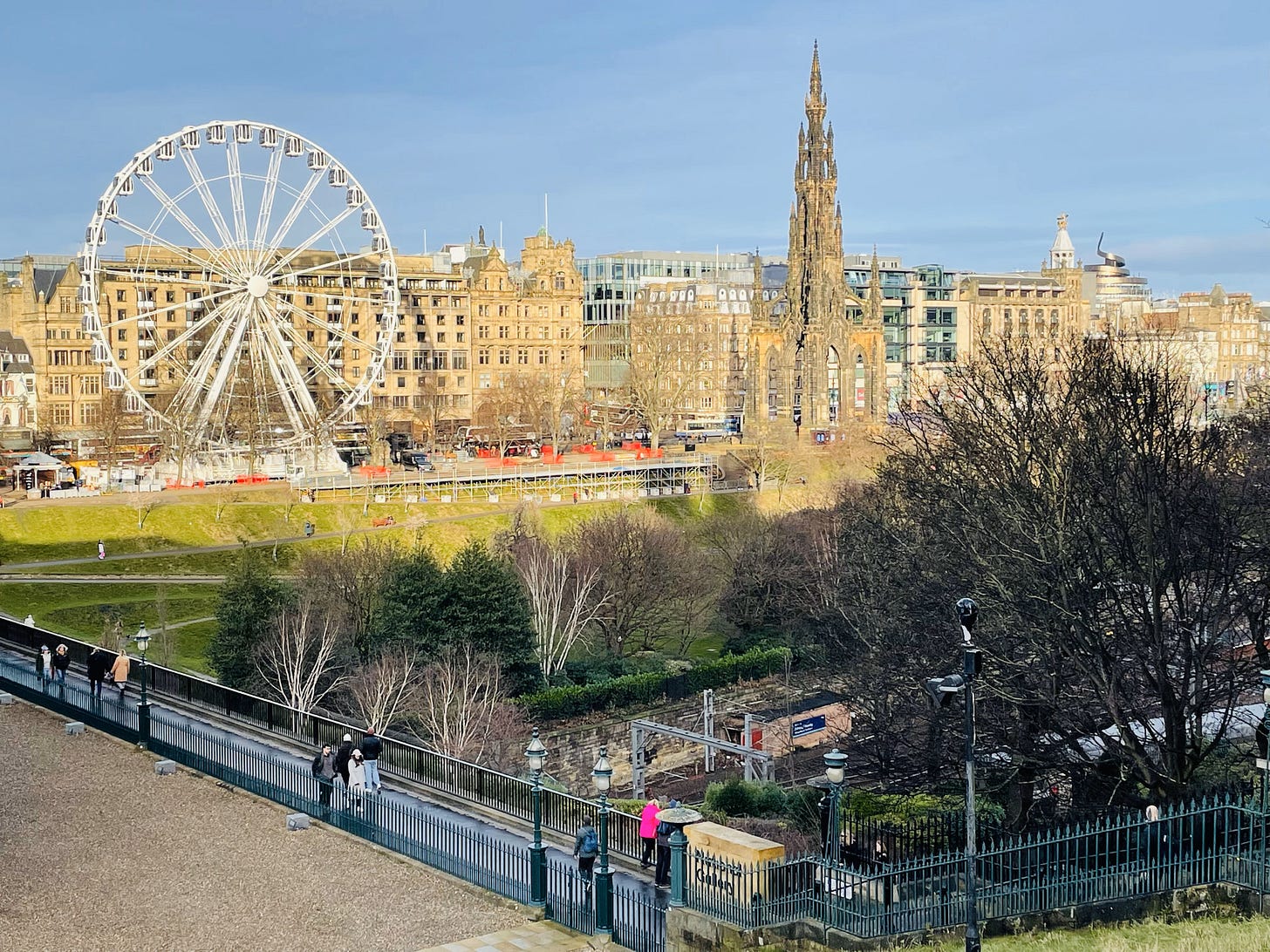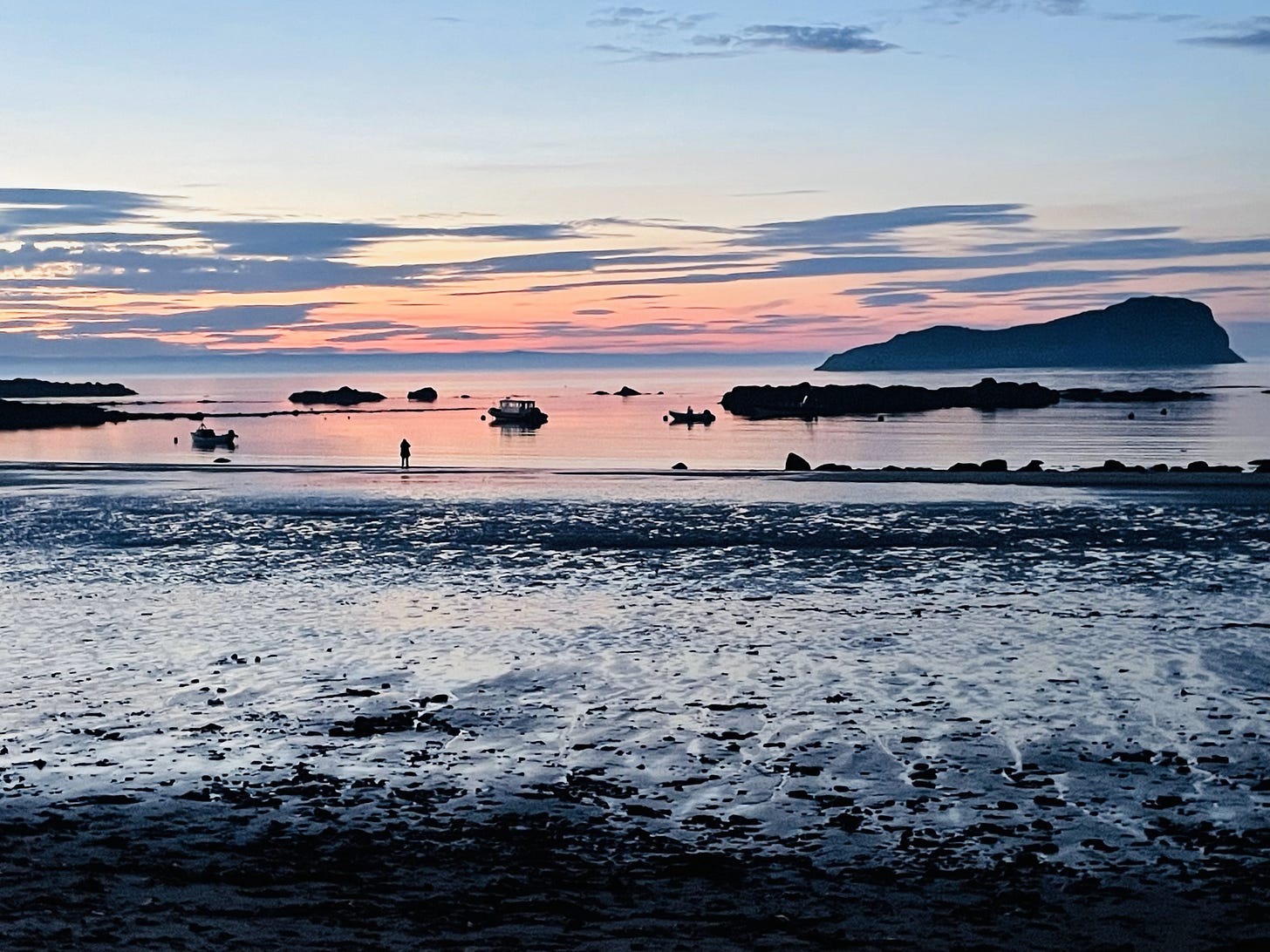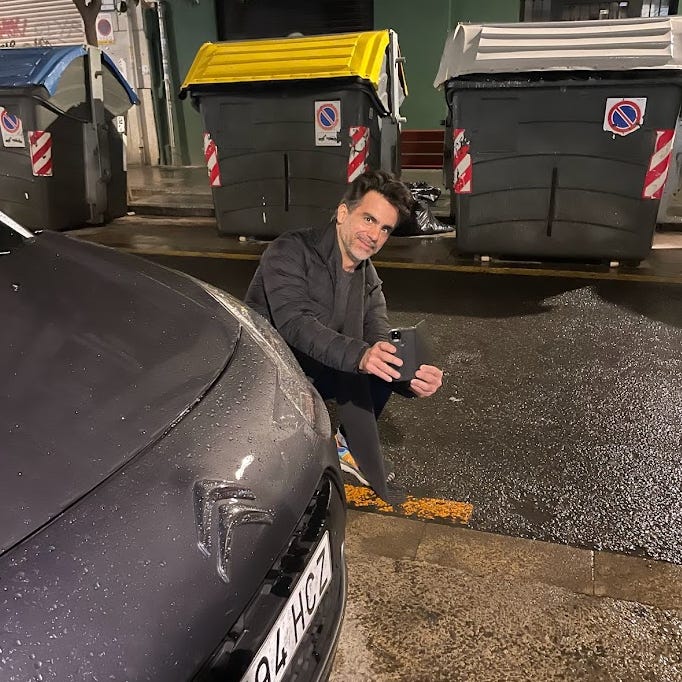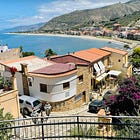Why I Left
Leaving the U.S. seems to be on a lot of minds right now
Thinking about whether to go or to stay?
A lot of people in the US seem to be pondering the question right now. This isn’t new, of course, and many in the UK have faced it since Brexit. The discussion seems to have gained momentum again recently, and while I thought I wouldn’t enter the fray, when I sat down to write to you this week, I found that I was writing about my own choice to leave. And I thought, why not? My words might be of use to someone pondering the issue.
The larger question of whether or not the US or the UK are broken I leave to others. But I will say that when I decided to change my life, part of what I wanted to change was my location. Let me stress that this post is about my own decision. Not about whether or not you or anyone else should leave.
This newsletter is free for all. Sign up so you won’t miss a post.
Here’s another reason this issue of leaving or not is on my mind: An online writer friend from the US arrived in Edinburgh recently for an extended stay. It was lovely to meet in person, and our talk inevitably turned to why she needed to get away for a while. She loves her home and her city, but she needed a nervous system detox. Living in America had become so stressful for her that she wanted a time out. She mentioned gun violence (which has come to her neighborhood) and the political and cultural climate as chief reasons for contemplating a more permanent departure as well.
Another friend of mine who followed the campaign and election news very closely has turned off all social media and found that has been immensely helpful. She is appreciating her life again, which happens to be in a relatively peaceful small town. When I mentioned this to my writer friend, she said that getting off the internet wasn’t enough for her. The toxic atmosphere pervaded the country, she felt, online or not, no matter where you were. The only option, she felt, was to get on a plane.
Many of you may have seen the viral Substack post from a few months ago that stated boldly that Europe won’t fix your problems. It was written in response to another viral post of last year about what was wrong with the way we live in America and why the author,
, was moving to Italy. More recently, there have been more pieces (including a new one by Kirsten) rejecting the idea that wherever you go, your life will be essentially the same.1I agree to some extent with the basic point by the author critical of moving to Europe (although she herself lives abroad). I don’t think we can assume that Europe or any change of scenery will fix our personal problems. We have to take care of our own mental and emotional house first, no matter where we live. I’m sure many people leave home hoping that a new city or country will fix them. That said, however, we are profoundly affected by the environments in which we live. There is simply no escaping that.
My own rather radical flight
For me, it was a host of things that felt toxic: not only my country but also my job, my marriage, my neighborhood, and even my house. For someone who loves their job and their home, leaving the US would probably feel drastic (so long as they feel safe, which frankly is hard in many, if not most, places in America today). For others, maybe a change in job or a move to a new part of town or a new city will give them the reboot they need. For many, getting a divorce can be upheaval enough. Dealing with one change at a time probably makes a lot of sense for most people.
I, however, threw the baby out with the bathwater, as my father would have said, if he had been alive. I decided that when my daughter left for college, I would leave everything behind and travel around Europe. I would pick up where I left off in 1992 when my backpacking trip got cut short by the death of a friend back home.
In more recent years, I had been returning to Europe in the summers with my daughter, teaching study abroad in Austria, Ireland, and France. Each time we went back home, I felt something was pulling me in the other direction. I felt a growing desire to go back not only to Europe but also to the person I was when I lived there (in high school for a year and after college for six months).
Somewhere along the way, becoming a professor, wife, and mother had taken priority. I had lost my former self, and I wanted to find her again—that adventuresome young woman who traveled without GPS or smartphone, met tons of new people, kissed boys she barely knew, and arrived in new cities without hotel reservations. I was brave and open then, but somehow I had forgotten what that felt like. My world had closed around me, in a crumbling old house, a fraught marriage, a toxic work environment, and a city that was losing its battle against gun violence.
(Have I mentioned that I lived in New Orleans for 17 years? The year before I left, my neighbor’s daughter was carjacked at gunpoint in front of our house on Christmas Eve. I consider it a miracle that none of my family or friends have been, so far, personally affected by gun violence. It felt like only a matter of time.)
But now, where to land?
My travels around Europe in search of my former self were just the beginning. I didn’t come to get my fill and go back home, although that may be just what someone else with Wanderlust and a desire to reconnect with themselves needs. (I believe travel, including solo travel, is hugely important for women, as well as all artists and writers, as I’ve written about before.2)
The fact is, my home in New Orleans was no more. And nowhere else in America felt like “home” to me. I had no real roots after being uprooted enough times in the course of my life. Nor could I imagine anywhere I wanted to live—at least not anyplace I could afford. Affordability is a big reason why a lot of people leave the US, actually.3
I was also fleeing stress, which I’ve written about before as well, the stress of the “default life,” I called it—the job, marriage, kids, the house that needs constant attention, all the stuff we accumulate, and way too many things to do.4 I ran all day trying to keep up with it all, eating at my computer, working every moment I could so that I didn’t feel I was falling behind. The American way of life, I think you might call it. It took a tremendous toll on me. I wanted out.
On my summers abroad, I had seen other ways of living, particularly in France and Ireland, and I wanted a life where people moved more slowly, walked more, knew their neighbors, and took their meals al fresco whenever they could.
I also wanted beauty. I wanted sights that would feed my soul, rather than freeways and brutalist architecture, strip malls and chain restaurants. (Sadly, a lot of the prettiest places in Europe are also full of tourists. There is a downside to so much beauty.)
I wanted trains and a strong network of public transportation that would allow me to live car-free. I wanted walkable cities with green space and beautiful buildings. I wanted the sea and mountains nearby without having to get on a plane to see them.
I also wanted to live where people took care of their history and valued the arts and literature. The number of historical sites all over the UK is astronomical. I love visiting them. And writers are revered all over Europe, particularly in Ireland and in France. Many European countries support the arts as part of providing a decent quality of life for their citizens, and I admire that.
So when I came to Europe to travel, I was also looking out for where I wanted to live the next phase of my life. But that hasn’t been easy. I still don’t know where I’ll be next year or any year thereafter. My desire to settle down in a new place hasn’t come to fruition. Getting a visa to stay once you’ve fallen in love with a place, as I have Scotland, is simply not a given.
So if I can give one piece of advice to all of those who may be considering jumping ship: carefully research the visa options (including income requirements) before you set your heart on a particular place.
I had done some preliminary research but not enough. I thought I could apply for the Global Talent visa in the UK, but it turned out that if you are a writer, you must write fiction or poetry. Nonfiction writers aren’t artists and therefore aren’t eligible for endorsement by the Arts Council. It’s a crazy gap in the system, if you ask me, and I fell right into it. There are no other alternatives in the UK for me—no freelancer or digital nomad or retirement visa, even.
For now I’m here on a student visa, which I can convert into a graduate visa. That means I can stay for about 3 more years. But then, unless I’ve suddenly become a published novelist with all kinds of good reviews in major outlets, I’ll be looking to move on. And you bet this time I’ll be doing my research ahead of time!
What are your thoughts and feelings about whether to go to or to stay? It’s a tough topic, I know. But I’m always happy to listen. I hope I’ve given you some food for thought. That is my highest aim with this newsletter—to give you stuff to chew on. So chew away!
Until next time,
Anne
P.S. If you enjoyed this post, please click on the heart at the bottom or the top of this email/post. It helps others discover Audacious Women, Creative Lives. And makes me super happy!
Kirsten Powers’s original post from Nov. 2023 was “The Way We Live in the United States is Not Normal.” “Europe Won’t Fix You” was written, partially in response, last August. Brian Wiesner has written some interesting articles on the topic as well, such as “How Important is Place” and “Europe Will Change You.” For Kirsten Power’s most recent post on the subject, see:
See Rocco Pendola’s Substack, Never Retire, in which he writes a lot about the finances of moving abroad and why life in the U.S. is not sustainable for many.










Thank you Anne for this honesty. I left in 2001 and every place I've lived - Prague, Lisbon, Lugano, Ljubljana - was due to visas that came with jobs. I was incredibly lucky. And my now-husband and I had to push forward getting married so I could live in Scotland. Visas and your financial situation are the two most important practical issues with moving abroad.
I'm a post-Bush Jr win leaver and have never regretted it. While life is life no matter where the setting, Europe did "fix" me - it has made me more empathetic, thoughtful, and respectful. I listen more. I question more. I'm more curious. I'm less impressed with stuff and gauche displays of wealth. I have friends in their 20s and in their 60s and everywhere in between. Being an outsider, an immigrant, is humbling and uncomfortable and I'm so very grateful that I've had these experiences.
Thank you Anne for continuing this conversation.
Perhaps it’s our age which suggests to us that we need to rediscover our younger, more confident, sassy selves. I’m rediscovering mine and I really like her 🥰 she has the temerity to say the things I might not (yet) have the courage to say, and plan for future stuff for myself where I’m not tied to a mortgage or a man or a myth of what we should have ‘achieved’ by middle age.
Get sassy girls xx